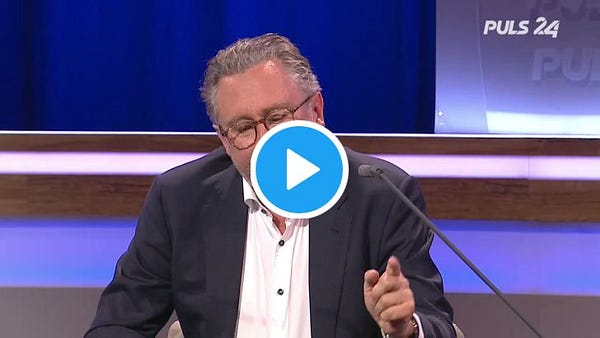Rotten Borough
The state broadcaster ORF's board of trustees chose Ronald Weißmann—widely believed to be the ÖVP's favored candidate—to be its next director general
Servus!
The tradition began 40 years ago when, on a baking hot summer’s day in 1981, the journalist Peter Rabl conducted an interview with then-Freedom Party (FPÖ) leader Norbert Steger in a swimming pool. It was the starting point for what would go onto become an annual television fixture: a round of interviews with the leaders of Austria’s main political parties known as the Sommergespräche. For the state broadcaster ORF, the interviews fill a yawning gap in their political programming brought on by the summer break; for the viewer, the interviews’ length and breadth offer an opportunity for deeper and more personal engagement with those who run the country.
That the Sommergespräche have become a summer focal point is testament to the ORF’s status as Austria’s broadcasting behemoth and its unique ability to shape Austrians’ viewing habits and the national political and cultural conversation. Indeed, right now, it would seem as if the ORF is the only story in town—and not only because of the Sommergespräche. On Tuesday, the race to become its next director general came to an end when the ORF’s board of trustees selected the broadcaster’s current deputy director of finance, Ronald Weißmann, to replace longstanding DG Alexander Wrabetz. Weißmann’s term in office begins at the start of next year.
To call the process by which the board of trustees chooses the ORF DG an election would be to do a disservice to democracy. Ostensibly independent, the board is in fact stacked with party political appointments who organise themselves in so-called ‘friendship groups’ along party lines. Of its 35 members, 9 are chosen by the government, 9 by the states, and a further 6 represent Austria’s political parties. The result is that, on the current board, 16 members are linked to the People’s Party (ÖVP) and somewhere between 2 and 4 independents are thought to be ÖVP sympathizers. The ÖVP, thus, currently holds a clear majority at the present time.
Weißmann was widely reported and believed to be the ÖVP’s preferred candidate, and in a forum broadcast by Puls24 in the days before the final vote, Wrabetz even alleged that chancellor Sebastian Kurz’s media advisor had instructed members close or sympathetic to the ÖVP to vote accordingly. Because the DG is chosen via an open as opposed to secret ballot, we know Weißmann won 24 out of the board’s 35 votes—including all 16 ÖVP members and all 3 from their governing partner, the Greens. There are many ways in which Austria’s political system operates less like a modern Western democracy and more like a sclerotic Soviet republic. The process by which the ORF’s DG is chosen is one of them.


This point is one Beate Meinl-Reisinger, leader of the liberal NEOS party, emphasized during her Sommergespräch broadcast Monday. Declining to state which candidate she preferred to run the ORF, Meinl-Reisinger said the question of who should be the next DG should not be the “play thing” of Austria’s political parties—and especially not its government. It cannot be the case, she went on, as seemed to happen on this occasion, that one political party, namely the ÖVP, can install whomever it wishes to run of the country’s most important independent institutions and watchdog organizations.
What Weißmann’s victory means for the ORF is unclear. The outgoing director Wrabetz grew up in the Social Democratic Party (SPÖ), chairing the Austrian Union of Socialist Students (VSStÖ) among other things, yet was able to run the ORF effectively under various coalition constellations. The FPÖ fears Kurz and the ÖVP will bring the ORF to heel, turning it into a regime-friendly broadcaster, an interesting observation from a party that has long griped about the ORF and the TV license which partly guarantees the broadcaster’s editorial independence. What is true is that the manner of Weißmann’s election means the ORF’s news content will be more closely observed from now on for signs of obedience or obsequiousness.
Bis bald!
Thank you for signing up to the Vienna Briefing. If you know someone who would be interested in receiving this newsletter, consider sharing it with them today.
Time For A Boost
Austrian health authorities will begin issuing booster coronavirus vaccines from October 17, nine months after the first round of second doses was administered, health minister Wolfgang Mückstein confirmed Tuesday.
An End To Free Tests?
The question of whether coronavirus tests will remain free will be reviewed at summer’s end, Mückstein also said Tuesday. Almost 60 percent of the Austrian population has now received at least one dose of a coronavirus vaccine.
Olympic Medals Haul
Austria finished the 2020 Olympics Games in Tokyo with one gold, one silver, and five bronze medals: the country’s best result at a Summer Games since Athens in 2004. Anna Kiesenhofer won gold in the cycling women’s individual road race, while Michaela Polleres claimed silver in the judo women’s 70 kg.



